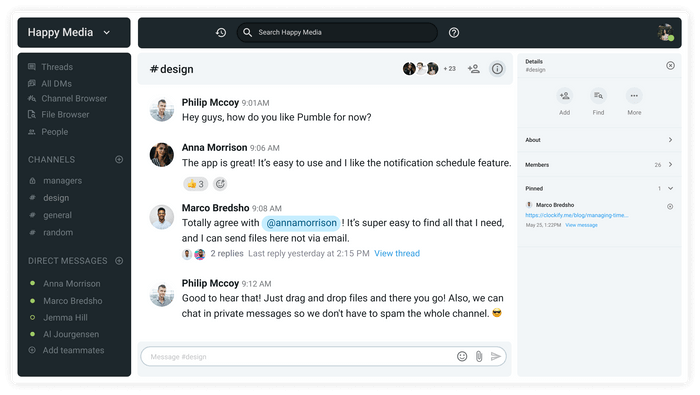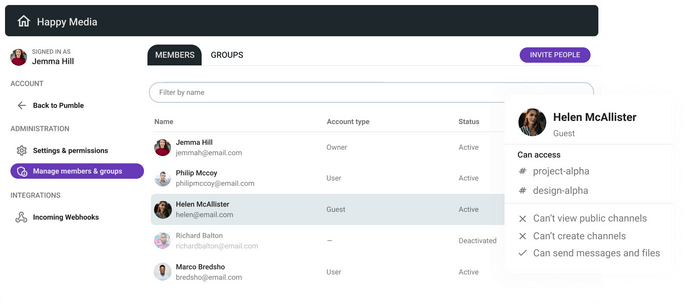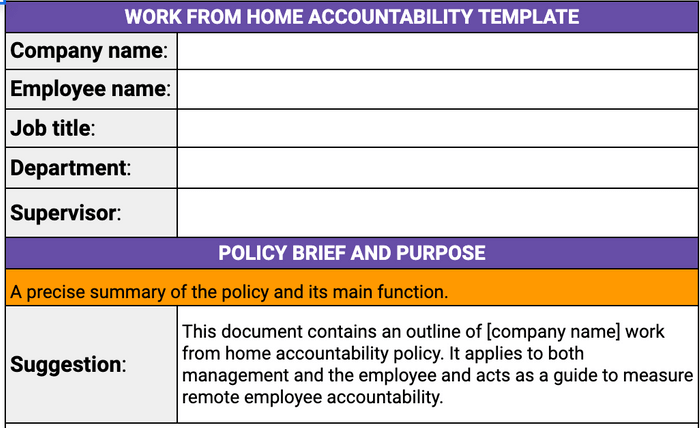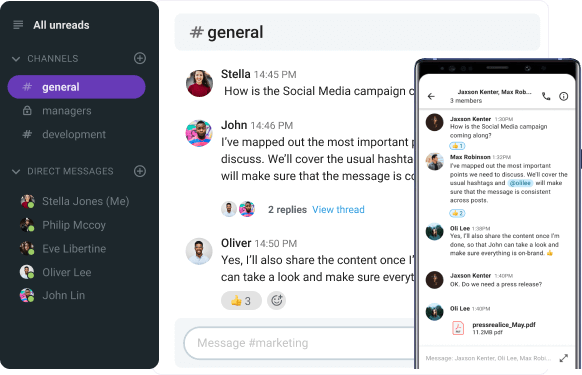Work-from-home accountability is one of the biggest challenges in a new, remote work setting.
At the same time, accountability is one of the greatest indicators of successful and productive teams. While it was rather straightforward to monitor and keep employees accountable in a regular in-office environment, work-from-home accountability brings a unique set of challenges for managers, business owners, and employees to overcome.
Of course, managers and leaders essentially trust their team with their assignments. However, there are many other specifics of the work-from-home model that make it difficult to measure employee accountability. Moreover, remote workers’ productivity isn’t necessarily consistent.
In this article, we will break down work-from-home accountability and explain its importance. We’ll also provide actionable tips for employees on how to be accountable and for managers on how to hold remote workers accountable. You’ll also find a free work-from-home accountability template to help you establish a framework of accountability with your remote workforce.
🔽 Quick access to a free template for work-from-home-accountability:
Work-from-home accountability template
What is accountability for remote workers?
Generally speaking, accountability means a willingness or obligation to take responsibility for one’s actions.
When translated into a remote work environment, the concept of accountability gets a wider scope given the specific nature of this work model.
For remote workers, being accountable includes delivering their assigned tasks with emphasis on the quality of output.
A more detailed definition of accountability for remote workers includes:
- Task completion
- Taking responsibility for their performance
- Meeting deadlines and delivering the expected output
- Keeping promises
- Fulfilling their obligations towards the organization
At the same time, managers’ accountability revolves around the success of their teams, while the accountability of the organization involves meeting the needs of the stakeholders and the clients.
Why is remote work accountability important?
Employee accountability is central to their performance which ultimately affects company goals and bottom line. However, worker accountability is especially important in a remote work setting due to a number of unique challenges this model brings.
With no room for face-to-face communication and a limited monitoring opportunity, remote teams may find it difficult to develop trust and team engagement. Moreover, managers need to put more effort into building accountability especially with new hires whom they never met in person.
Insufficient work-from-home accountability leads to decreased team engagement and morale, missed goals, and higher employee turnover rates.
Let’s take a closer look at the key benefits of work-from-home accountability to get a better insight into its impact on remote team success.
Remote work accountability establishes trust
Trust is important in a regular in-office setting, but it’s even more highlighted in a remote environment where team members may have never met in person. And, with globally distributed teams and working across time zones, building trust becomes even more important.
Creating employee accountability involves setting clear communication and collaboration processes that help remote teams establish trust between each other and the organization as a whole.
Award-winning HR professional, Brenda Neckvatal, highlights the correlation between employee trust and accountability:
“The greatest challenge in any group dynamic or company is building trust. Employees want a culture they feel they belong to — one they can trust. When trust is in place, it is usually reciprocated by showing up and doing the best job possible.”
Remote work accountability improves employee performance
Accountable remote workers are more likely to set clear goals and work towards achieving them. They understand how their work affects the organization’s bottom line and they are more likely to put more effort into reaching common goals.
Remote work accountability increases employee engagement
According to a report by Glassdoor, teams with engaged employees perform 200% better than disengaged teams. In line with this information, it’s important to cultivate employee accountability as it lays the foundation for higher engagement.
Work-from-home accountability fosters a more driven workforce. An accountable remote worker will show higher engagement when completing their tasks. Another common trait of accountable remote employees is that they show a greater willingness to collaborate with their coworkers to achieve company goals. They are also more likely to show initiative and work on developing new strategies, promote innovation, ask for feedback on where to improve their performance, and own up to their mistakes and shortcomings.
Pumble makes achieving work-from-home accountability easy
5 Tips on how to hold remote employees accountable
Now that we have a better understanding of the importance of work-from-home accountability, it’s time to learn how to develop it in your team.
Organizations play a vital role in developing work-from-home accountability with the workforce.
Here are five key ways of how companies and managers can foster a culture of remote employee accountability.
#1 Set clear expectations 📄
When building work-from-home accountability, it’s important to remember that your team members may feel a bit out of place in a new work setting and that they need additional guidance. To help your team navigate the waters of a remote work setting and build accountability, consider developing a clear work-from-home accountability strategy from the beginning.
Brenda Neckvatal shares a similar opinion:
“The company and leaders must be clear on what the expectations of performance are. This includes establishing key performance indicators (because what gets measured — improves), behaviors, due dates, operating parameters, as well as when to communicate issues and challenges and who to speak to about them.”
The strategy should include extensive, written work-from-home policy and culture documents that cover some of the most important processes, procedures, and employee expectations when working from home. This includes anything from working hours and tools, to quality standards and security measures. Ensure that your remote teams know how to operate and what their responsibilities entail when working from home.
The next step includes making sure you’ve communicated it clearly and all team members have read and understood the work-from-home policy. This will help prevent potential misunderstandings down the line.
It’s also a great practice to start with work expectations early on in the hiring process. Look for candidates who possess strong self-discipline and motivation as these are all strong indicators of accountability. Moreover, consider assessing people for communication, time management, and collaboration skills to determine their commitment to teamwork and engagement, as well as their general aptitude for remote work.
#2 Develop adequate communication 💬
One of the common challenges remote teams face is a lack of quality in hybrid communication. Newly remote teams often find it difficult to walk the fine line between the generally productive overcommunication on one hand, and going the opposite route and sharing excessive, irrelevant, and untimely information.
This is why it’s paramount for remote teams to develop a strong remote communications strategy. In addition to building better connectivity throughout remote organizations, adequate communications can also serve as a powerful tool in building employee accountability. Understanding proper ways to communicate will help employees better understand their responsibilities and express their needs, concerns, and take ownership of their responsibilities and shortcomings.
To establish adequate remote communication, consider the following steps:
- Set standardized communication procedure that defines official channels, proper information sharing, and general etiquette rules for remote communication.
- Overcommunicate to make sure your team members understand the specific project-based objectives as well as the larger company vision and mission.
- Offer regular feedback to ensure employees understand their performance, progress, and improvement points.
- Reduce the use of email in remote communication as it may be ineffective for quick, urgent conversations.
- Encourage video conferencing to create better connectivity between team members and foster a sense of accountability between teammates.
- Organize in-person meetings and team-building events, if the geographical distance and time zones allow, to create a more tight-knit community.
- Use effective team communication tools, such as Pumble, for both project-specific and informal conversations to streamline your team communication and collaboration and allow team members to connect over shared interests.

Adequate communication facilitates collaboration and helps remote teams overcome issues in a timely manner — which all leads to developing better team accountability over time.
#3 Document company processes 📝
As we discussed earlier, remote teams rely on additional guidelines to drive employee accountability and performance.
As there are insufficient opportunities for in-person conversations around company processes, remote teams are turning to asynchronous communication to fill in the gaps of distributed team communication. The ability to keep track of all communication and collaboration records despite time zones of geographical differences allows remote teams to maintain optimal productivity and performance.
In line with this, organizations working to improve work-from-home accountability should follow the same principle when it comes to all company processes. Allowing easy access to all company procedures and workflows will help employees get clear guidelines they can use as checklists when they are not sure exactly what their responsibilities entail. Creating a shared knowledge hub available to all employees helps to ultimately amplify work-from-home accountability.

Pumble makes sharing resources easy
#4 Apply a results-based approach to measure success ✔️
Essentially, accountability is delivering the tasks assigned to you. Therefore, to better manage and assess your team’s success, you can track and measure the output.
When measuring the output, it’s best to focus on productivity. As mentioned earlier, successful remote teams achieve higher productivity which may be attributed to fewer distractions and reduced commute time. Either way, productivity in a remote setting can be taken as a relevant indicator of remote teams’ success.
Here are some ways to measure remote work output:
- Define KPIs to better guide your team’s decisions and ensure you’re focusing on the right metrics. In fact, studies show that the proper implementation of key performance indicators is instrumental to measuring team performance. For example, you can track your team’s collaboration, the quality level of their production, and track whether they are meeting deadlines.
- Create a remote employee productivity template to keep everything organized and recorded.
- Use project management or productivity monitoring tools to automate specific processes and track and improve your team’s productivity and accountability.
#5 Leverage the right tools 🔧
Every successful remote team relies on relevant tools to streamline different processes and boost productivity.
According to Dr. Elizabeth Lombardo, leaders and managers need to be able to pick their battles in terms of recognizing when to nudge their team in the right direction by pointing out relevant information and tools, instead of jumping in to solve every problem:
“You must understand as a leader that not all difficulties are your problems. You must train yourself to resist the impulse to solve every problem for your direct reports. Playing the hero will eventually detract from your team’s glory. Don’t jump to the answer right away when a team worker or member comes to you with an issue. Asking them how they plan to solve the problem and providing the necessary information or tools to assist them in getting there is a better approach. As a result, your staff will be able to take ownership of their problems and develop solutions.”
When looking to encourage accountability, organizations can find great use in diverse technology options available to foster efficiency and productivity.
Let’s get a closer look at specific categories and tools you can use to achieve better remote accountability.
- To streamline project progress tracking, monitor deadlines, and track team members’ tasks and responsibilities, remote organizations can use project management platforms like Jira or Trello.
- For productivity monitoring, successful remote teams use Clockify or Hubstaff to track the time their teams spend on specific tasks and to then identify opportunities for improvement.
- To improve team communication and collaboration, you can use business messaging apps like Pumble to organize conversations in channels, group chats, or private messages, share files and feedback, and invite third-party guests to collaborate on specific projects.

#6 Use a work-from-home accountability template
Creating a solid work-from-home accountability policy will help you define and communicate company procedures and objectives to your workforce. In addition, a work-from-home accountability template allows more streamlined ways to track, measure, and record remote employee accountability.
Consider crafting a work-from-home accountability policy to gain better insight into your team’s performance. Record specific metrics for a clear overview of how your remote employees are meeting deadlines and other set KPIs.
To help you speed up the process, we’ve created a free remote accountability template.

Tips on how to be accountable while working remotely
If you’re a remote worker, you understand the occasional dread of having your office next to your bed and no real peer or team leader pressure to help you put your best foot forward every day. Although most remote workers report feeling more productive in general when working from home, this can fluctuate. And when you hit that unproductivity wall it’s harder to get back on the accountability track without the immediate presence of your boss or a team leader.
However, there is a strategy to help you keep a consistent level of accountability despite the general nature of a work-from-home setting.
Let’s break down a 5-step process to achieving better accountability as a remote worker.
#1 Make sure you understand the why of your position and responsibilities💡
Understanding the company mission and vision will not only help you feel more connected to your organization and culture, but it will also provide immense benefits to your overall accountability and productivity.
When you understand how the tasks you perform at work contribute to the overarching vision, you will gain additional motivation and drive to perform your best and keep yourself accountable even without any additional incentives from the management.
To gain a better insight into your organization’s mission and vision, make sure to be proactive in your quest for more information on the subject. Once you’ve read the official company statements, discuss your position and responsibilities with your superior to ensure you understand how your work impacts the larger picture.
#2 Set clear goals and priorities 🗒️
Now that you have a clear understanding of the company objectives, it’s time to break them down into smaller pieces to create your individual plan.
It’s rather easy to lose sight of any goals and objectives when you’re sitting on your couch in your PJs not feeling like your most business and productive self. This is why it’s paramount to have a clear list of daily, weekly, and monthly goals and objectives to help keep you on track. In fact, research shows that you can improve your productivity by 15% through adequate goal setting alone.
Consider writing down your priority list and goals to use as a checklist and motivation when you feel stuck.
Pumble makes communicating goals and priorities easy
#3 Work on self-improvement 👩💻
Accountability means being responsible for your actions and ensuring that you deliver your assignments on time and with maximum quality performance. In addition, accountability implies practicing self-awareness and being able to identify your mistakes, own up to your shortcomings, and ultimately learn and improve your performance.
Developing a growth mindset will help you improve performance and accountability, along with providing immense benefits for your professional and personal development.
For starters, ask your team leader for regular feedback to help you pinpoint areas and skills that need improvement. Look for relevant resources both within and outside your organization to kickstart your skill development. Company workshops, skills development programs, and industry webinars, and online courses can be valuable sources.
#4 Ask a buddy for help 🧑🤝🧑
A remote work setting doesn’t offer plenty of opportunities to experience positive effects of peer pressure, usually present in in-person interaction. However, you can still create this scenario from your home office. All you need is a functional project tracking system and your favorite coworker one ping away, and you’re all set.
Ask your favorite teammate to help keep each other accountable and add some fun to your regular daily routines. You can create an accountability buddy system to suit your needs, schedules, and styles while ensuring maximum quality performance. Use tracking tools to measure the time you spend on each project, set each other’s deadlines, and create weekly rewards for best performers. If you want to raise the stakes, you can ask your entire team to join the game and improve team accountability in the process.
#5 Create a productive routine 🧘
A home office setting can often lead to skipping workouts, poor diet choices, and falling into an unhealthy and unproductive routine which — study finds — heavily impacts your work performance and productivity.
To avoid falling prey to these work-from-home traps, make sure to develop a solid wellness plan that benefits your productivity.
Some of the best practice tips suggest creating a work schedule that resonates with your peak productivity hours to ensure you are properly utilizing your energy and cognitive ability.
Moreover, a light workout upon waking up is also shown to help remote workers feel energized and ready to tackle their work tasks.
Nutrition also plays an important role in your well-being and productivity alike. After all, we’ve all experienced extreme sluggishness and sleepiness after indulging in a greasy fast-food takeout. At the same time, we can also understand the impact of healthy nutritionally balanced meals on our cognitive and physical performance. The math is clear — healthier dietary choices enhance work productivity.
💡 For more tips, be sure to check out our guide on the blog on how to improve your productivity as a remote worker.
Wrapping up: Remote accountability depends on building a trusting environment
Work-from-home accountability is integral to the success of remote teams. In addition to improving employee engagement and performance, solid employee accountability also helps establish trust company-wide which is especially beneficial to remote, distributed teams.
Achieving remote employee accountability, on the other hand, is a slow process that promises immense returns.
To establish better remote employee accountability, try the tips provided in this article and craft a top-performing remote culture within your organization, or take your accountability up a notch if you’re a remote employee struggling to keep a consistent stream of productivity when working from home.







